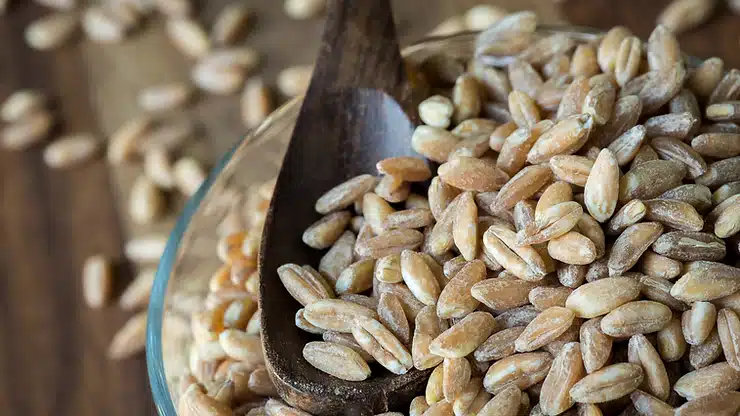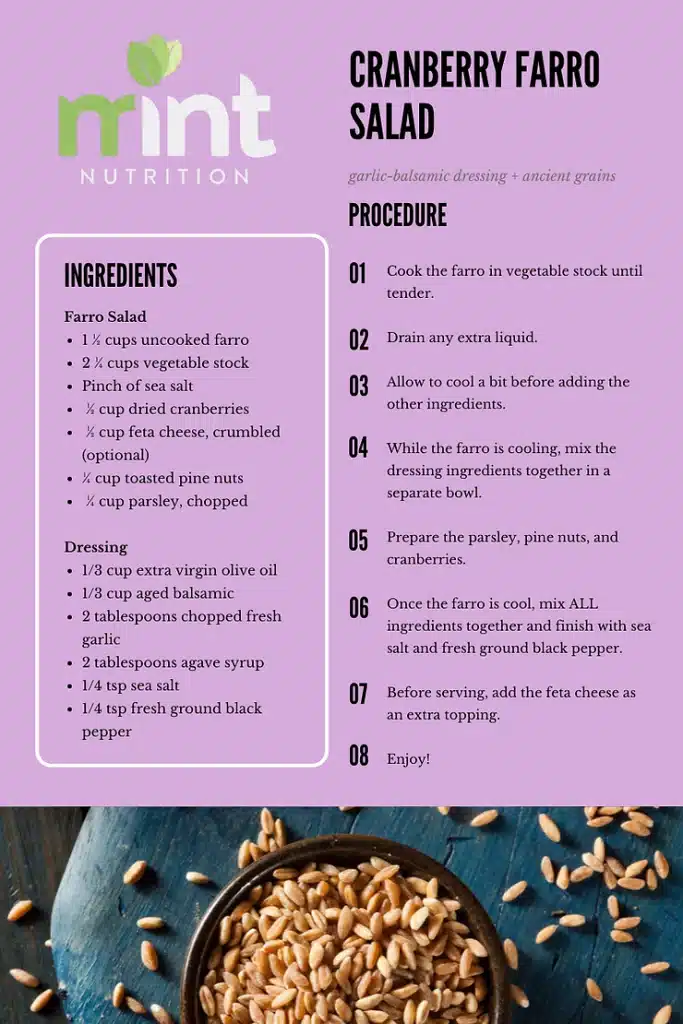
With origins dating back to the Fertile Crescent era—the height of Egypt—farro is as an ancient grain that’s as old and sacred as it is nutritious and delicious. For centuries, farro has been a staple among Roman and Italian cultures alike. Late to the farro game, but finally in it nonetheless, the U.S. is starting to recognize and incorporate this fun and diverse ancient grain into its culinary repertoire. While still not widely used throughout the U.S., farro is popping up as a contender for one of the biggest food trends in the last decade.
In this month’s post, I’m going to dig into some of the benefits of farro, as well as share one of my favorite farro recipes with you: Cranberry Farro Salad. I can’t wait to share this tasty, nutritious treat with you. And then for you to share it with loved ones, including yourself (pair it with my Socca and you’ll have a fresh feast for all to enjoy).
OK, let’s get to the farro!
No matter the type of farro, you can expect a firm, chewy texture and slightly nutty flavor every time farro is involved.
While there are a few types of farro, emmer wheat is what you most commonly find stocked in your local grocery store shelves. No matter the type of farro, you can expect a firm, chewy texture and slightly nutty flavor every time farro is involved. As a chef and culinary artist first (from day one, basically), I love imagining the wide array of dishes, recipes, and salads farro could be used in. Both its texture and its flavor lend themselves to all kinds of dishes.
In thinking about one of my favorite farro recipes of all time (the one I’ve included below, Cranberry Farro Salad), I immediately gravitate towards the many ways in which farro only enhances the dish, instead of detracting from it. This Cranberry Farro Salad really showcases the nutty, chewy texture of farro, as well as its ability to soak up the tasty dressing. As a result of the farro soaking up whatever dressing or flavoring you use with it, it often tastes even better when consumed the next day. Can I get an amen for leftovers?!
The modern diet era has vilified grains and labeled them bad for your health. Top diet trends over the last few years, like the Paleo and ketogenic diets, have even avoided grains all together. But, are grains (including farro) that bad for you?
From farro, rice, and buckwheat, to barley, amaranth, and couscous, grains are an incredible way to diversify your diet.
As the owner and resident dietician, nutritionist, and chef extraordinaire here at Mint Nutrition, I wholly believe in creating personalized plans for every single individual who comes to me. Here, there is no one-size-fits-all approach. In fact, it’s the cold, hard truth that grain-free diets limit us in a lot of ways, especially when it comes to getting the kinds of nutrients and healthy fibers we need. To put some icing on the grain-free cake, there people often experience negative side effects from a grain-free diet, including constipation, bloating, and slow motility. No fun and no thank you, m’am!
From farro, rice, and buckwheat, to barley, amaranth, and couscous, grains are an incredible way to diversify your diet. Depending on which grains you consume and how much, they can help make sure your body gets a wide range of nutrients, vitamins, minerals, proteins, and antioxidants. They can also increase your intake of dietary fiber, which contributes to overall health and weight loss.
A diet that includes whole grains has been shown to lower the risk of diabetes, heart disease and blood pressure.
It’s good to keep in mind that when we do eat grains (daily, I hope!), we want to opt for ones that are limited in processing. The golden grain rule? Whole grains are best—refined grains are what we want to avoid.
A diet that includes whole grains has been shown to lower the risk of diabetes, heart disease and blood pressure. And thanks to all that healthy fiber, grains are also really good at keeping things moving and regular. Wahoo for bathroom regularity!
For quick reference, here’s a list of the best whole grains to add into your diet. Use ‘em all and use ‘em often—they’re incredible, healthy, and almost never disappoint. Oh, and don’t forget to check out my Great Grain Bowl (sooo good).
Ingredients Lists
Cranberry Farro Salad
1 ½ cups uncooked farro
2 ¼ cups vegetable stock
Pinch of sea salt
½ cup dried cranberries
½ cup feta cheese, crumbled (optional)
¼ cup toasted pine nuts
¼ cup parsley, chopped
Garlicky Balsamic Dressing
1/3 cup extra virgin olive oil
1/3 cup aged balsamic
2 tablespoons chopped fresh garlic
2 tablespoons agave syrup
1/4 tsp sea salt
1/4 tsp fresh ground black pepper

Looking for other easy, healthy recipes from Mint Nutrition? Start here, and be sure to follow Mint Nutrition on Instagram for continued recipes, tips, and insight.
As a certified integrative and functional dietitian, it’s my job to come up with tasty, healthy recipes and meal plans for individuals (neat, I know). To learn more about how my recipes and meals can best serve you and your specific needs, schedule a 15-minute consultation with Mint Nutrition today.

Integrative Nutritionist & Dietitian
"*" indicates required fields
Oops! We could not locate your form.